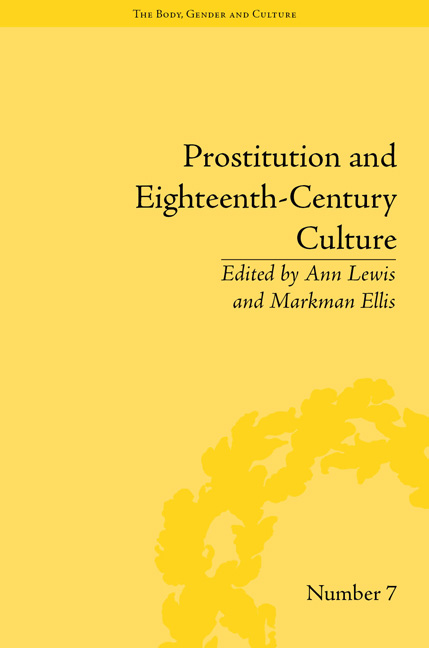Book contents
- Frontmatter
- CONTENTS
- Acknowledgements
- List of Contributors
- List of Figures and Tables
- Introduction: Venal Bodies – Prostitutes and Eighteenth-Century Culture
- Part I (Auto)Biographical and Classificatory Fictions: Madams, Courtesans, Whores
- Part II Visibility and Theatricality: Fiction, Image and Performance
- 6 Prostitutes and Erotic Performances in Eighteenth-Century Paris
- 7 Visible Prostitutes: Mandeville, Hogarth and ‘A Harlot's Progress’
- 8 The Narrative Sources of Candide's Paquette
- 9 The Prostitute as Neo-Manager: Sade's Juliette and the New Spirit of Capitalism
- Part III The Magdalen House: Marriage, Motherhood, Social Reintegration
- Part IV Wider Perspectives: Constructing the Prostitute in Social History
- Notes
- Index
9 - The Prostitute as Neo-Manager: Sade's Juliette and the New Spirit of Capitalism
from Part II - Visibility and Theatricality: Fiction, Image and Performance
- Frontmatter
- CONTENTS
- Acknowledgements
- List of Contributors
- List of Figures and Tables
- Introduction: Venal Bodies – Prostitutes and Eighteenth-Century Culture
- Part I (Auto)Biographical and Classificatory Fictions: Madams, Courtesans, Whores
- Part II Visibility and Theatricality: Fiction, Image and Performance
- 6 Prostitutes and Erotic Performances in Eighteenth-Century Paris
- 7 Visible Prostitutes: Mandeville, Hogarth and ‘A Harlot's Progress’
- 8 The Narrative Sources of Candide's Paquette
- 9 The Prostitute as Neo-Manager: Sade's Juliette and the New Spirit of Capitalism
- Part III The Magdalen House: Marriage, Motherhood, Social Reintegration
- Part IV Wider Perspectives: Constructing the Prostitute in Social History
- Notes
- Index
Summary
The heroine of Histoire de Juliette (1797) is Sade's fantasized version of a violent, cruel and perverted female libertine. Drawn from a young age to sexual experimentation, Juliette routinely participates in rapes and murders and becomes an advocate for the necessity of evil in the world. But there is another version of the character, which appears briefly in two earlier texts dedicated to her innocent and virtuous sister Justine: Les Infortunes de la vertu (1787) and Justine, ou les Malheurs de la vertu (1791). Both texts stage the life of Juliette, the orphaned daughter of a bankrupt financier who decides to make a career selling herself to rich Parisian aristocrats. These two texts portray her rapid ascent through the social strata of Ancien Régime France, from a young girl in a convent to a common prostitute, and eventually to a respected – if still promiscuous – noble-woman. What is particularly striking about this early Juliette is her concern for economic calculation: she is first concerned with survival and carefully accumulates cash, property and titles in an attempt to gain ever greater economic power and social prestige. If each venal transaction brings new acts of libertinage, it also reaffirms Juliette's keen understanding of what drives the production, multiplication and preservation of wealth.
- Type
- Chapter
- Information
- Prostitution and Eighteenth-Century CultureSex, Commerce and Morality, pp. 127 - 140Publisher: Pickering & ChattoFirst published in: 2014



